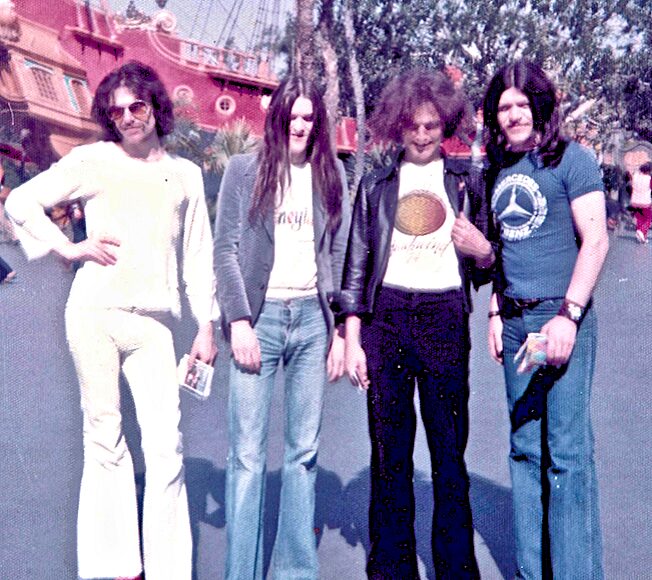News of a space rock band called Hawkwind making waves back in the old country had reached the US even before ‘Silver Machine’ became a global smash hit in 1972. In Search Of Space, their breakout album from the previous year, had been reviewed enthusiastically by the American music press, including Lester Bangs in Rolling Stone, who excitedly described it as “music for the astral apocalypse” and “psychedelic from the cover to the fadeout of the last groove.”
While the States had succumbed to a deluge of schmaltzy pop, ersatz country rock and southern boogie, there was still a considerable number of heads, freaks and stoners who were only too ready for a band who could fill the void left behind by the break-up/mellowing out of US psychedelic pioneers such as the Grateful Dead and Jefferson Airplane.
And so, plans were hatched to create an American showcase tour for Hawkwind, scheduled for November/December 1973.
As manager Doug Smith remembers, it was a surreal and potentially hazardous undertaking:
“Greg Lewerke, who at the time was the international A&R guy at the American label – big beard, always had the best grass – fell in love with the band, and Barbara Scott the press officer got the same vibe. But prior to the tour, Barbara had Miles Copeland in the office – dangerous man! – and his comment to her was, ‘I don’t know how the hell they’re going to get into America, they’ve had so many drug busts.’ So I got this panicked call from Barbara, ‘Oh my God, we’ve booked this tour, done all the advertising, why didn’t you think about this??’ All this verbal done the phone. I just said, ‘We are coming,’ and slammed the phone down! Then I get a call from the Chicago promoter, pleading with me, ‘You’ve got to come, we’ve sold out!’ The Chicago Auditorium, 6,000 people…”
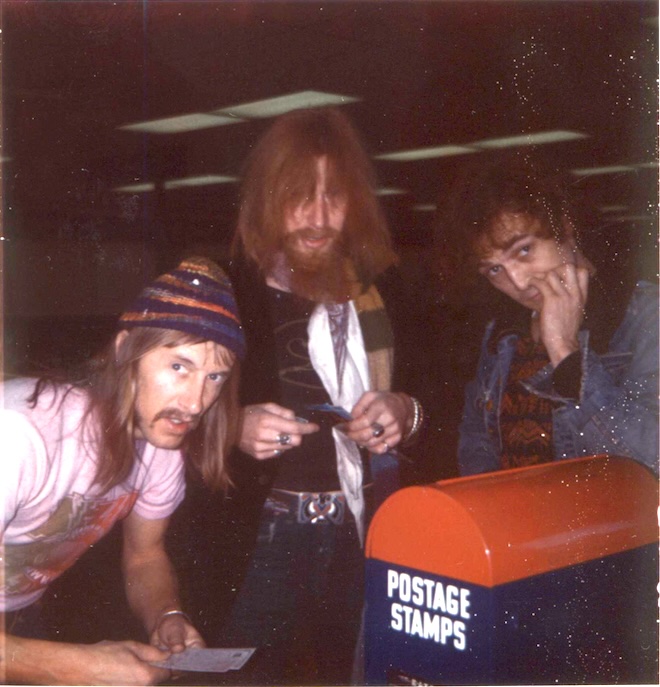
Saxophonist and frontman Nik Turner was sent ahead to do promotion:
“I did syndicated press in New York, then San Francisco and LA. When we were touring, Hawkwind was being played all the time on the radio stations – everywhere we went, I was doing interviews, and they would play ‘Master Of The Universe’… We had a record company over there who were putting a lot into publicising the band, and in America, we were managed by Steve Lieber and David Krebs, who were the management of the New York Dolls and Aerosmith.”
Band leader Dave Brock remembers being overwhelmed by the whole experience:
“It was quite something, it never really sunk in. It was a different culture, and there’s lots of strange stories from some of these places we played. We did this big place in St Louis, and when I went round to the box office, they were actually taking guns off people, booking them in with these guys’ names on – fucking hell! And believe it or not, some of the police were dealing in dope. The police are knocking at the door, and the promoter’s saying come in. We quickly stop rolling joints, but he’s saying, ‘It’s alright, these guys have got some marijuana for us!’”
Everyone was blown away by the audiences’ response. Doug Smith:
“It was phenomenal, and a complete surprise. None of the other gigs sold out like Chicago, but the others all did 60-70%. LA did nearer 90%. When we arrived in San Francisco, we were met by a convoy of cars and vans, Hawkwind posters all over, flags flying, and they drove us into the city, about 20-30 vehicles.”
Nik Turner:
“People were quite curious about us. Yes, we were a psychedelic band, but we were an English band playing the Space Ritual, which was a move away from psychedelia, it wasn’t just long guitar solos and loads of reverb and shit like that, like an American band. It was quite a departure from what bands like The Doors and Jefferson Airplane were playing.”
The band returned for a more extensive tour in March 1974, billed as ‘The 1999 Party’, including a benefit gig at the University of California in Berkeley for the recently jailed Timothy Leary. Turner had visited Leary in prison, where the acid evangelist had outlined his plans to escape, which involved Hawkwind being suspended from a helicopter and performing above the prison as a diversion…
But tour manager Alex ‘Higgy’ Higgins recalls that America could also be a dangerous place for a band like Hawkwind:
“I remember one time we were heading south, we’d got these big station wagons – I was driving one and Del Dettmar was driving the other – and we were steaming down the road, loving these cars. And all of a sudden the blue lights go up… They pulled us up before the local magistrate, and he was looking at us, a southern guy with a white suit on, thinking, ‘Oh God, what is this?’ We just pleaded ignorance, got fined and let go. Funny at the time… Then when we were right down south, doing this gig in Nashville, right in redneck country, all these guys with long hair, and Stacia… They did not like us at all, they were threatening to break into rooms and do people over. It was a dangerous time down there. We were just travelling by ourselves in cars. It was our pure ignorance of the American lifestyle, the potential threat (that exists) in America when you’re doing something different.”
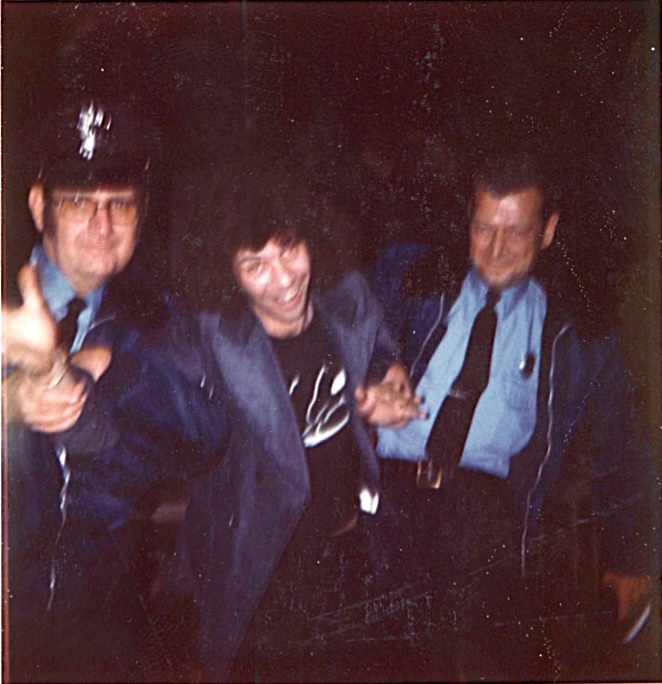
In September 1974, the band embarked on their third US tour in twelve months. But after their show at the Civic Center in Hammond, Indiana, the band were surrounded by police and served by IRS officers with an $8,000 tax bill owing from their last visit. Unable to pay immediately, their equipment was impounded and the band were effectively placed under house arrest in their hotel. Taking a break while the problem was sorted out, the story blew up back in Britain, with excitable headlines about Hawkwind being thrown in jail.
Drummer Alan Powell remembers himself and Lemmy taking full advantage of this downtime:
“There was a two week gap halfway through that American tour because some gigs had been cancelled, so Lemmy and I went to Los Angeles, ostensibly to do PR for the band, but in actual fact, it turned into a mid-70s ten-day debaucher! We were staying in the Hyatt House, which was notorious for its rock & roll milieu, and that’s where Lemmy wrote ‘Motorhead’. He’d been up all night, and he came in at five in the morning, and said, ‘Hey Al, listen to this!’ And he knocks this song out, “Sunrise, wrong side of another day…” And I thought, ‘Good song that…’”
But the wheels started to seriously come off Hawkwind’s American bandwagon when they returned in May 1975. Stopped and searched at the US/Canada border, Lemmy was found in possession of two grams of white powder and carted him off to jail.
Doug Smith:
“A New York lawyer I knew arranged for representation for Lemmy by engaging a Canadian lawyer. On arriving at the hearing the following morning, the lawyer found Lem sitting in the foyer waiting to tell him that the whole thing had been dismissed, as the white powder turned out to be amphetamine sulphate, which was considered a pure food in Canada. Lem was held for less than twenty-four hours! He couldn’t have been released sooner… But the band had a meeting the next day, where they decided to send Lem home to sort out his bust from the UK, even though they knew he had no further charges to face… Later that evening, I had Lem on the phone for a long time. He was very, very upset, he couldn’t believe he’d been sacked.”
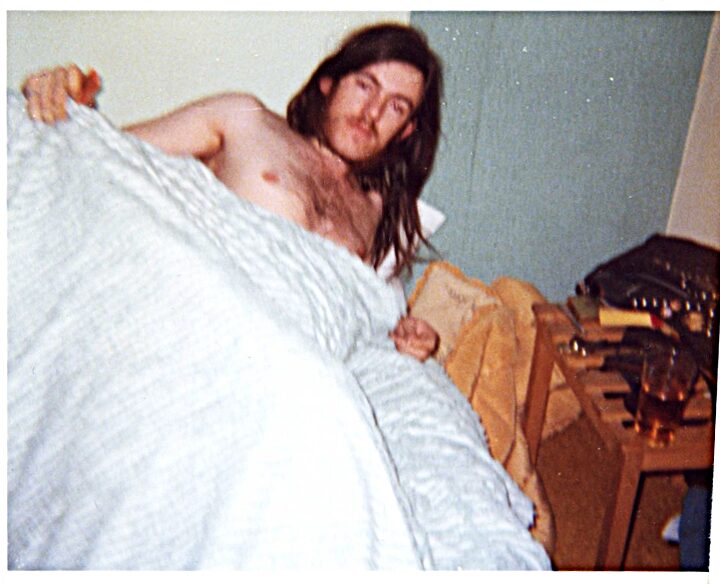
Nik Turner:
“I wrote these notes on the road in ’75 in America which included me sacking Lemmy from the band, which I was very sad about. It was really hard, but Lemmy was difficult to work with, he was doing a lot of speed and then he got busted. He wasn’t an easy person to work with because he was so cocky, and always right…”
After leaving United Artists, and losing their American deal, Hawkwind didn’t return to the States again until March 1978. The group’s US fanbase had shrunk considerably and their star keyboard player/violinist Simon House had just left to join David Bowie’s live band.
Doug Smith had stopped managing them, but caught the opening gig in New York:
“I went and saw them at the Bottom Line, and I just knew it was over. It’s a really tiny room all set with tables and chairs and jugs of beer, a typical American bar type place. They were on a small stage, and there must have been a lot of anger going on, because [frontman Bob] Calvert had a sword and was sweeping it around in great swishes, and he must have missed Dave closely on four occasions! Anyway, there was something going on. Simon [King, drummer] spent the next day hanging out with me and he wasn’t very happy. They just knew they shouldn’t be playing on this level. They were doing clubs…”
For replacement keyboard player Paul Hayles, it was a bizarre adventure:
“Dave wanted me to have a stage image, so on the first day in New York, we went to this army surplus store and he bought me this one-piece tank crew garment, and said, you want to wear a balaclava with it. Later on that day, Dave said, come on, put your outfit on, we’re going to go and freak out Bob! We went to his room, knocked on the door, and when he opened it, we pinned him to the bed and started screaming demands for all sorts of things at him. And when he’d shat himself, we took the balaclavas off, but he didn’t see the funny side at all!
“The Tower in Philadelphia was a fantastic gig, we got a huge reception. It was one of those gigs where we came off, and the people from Sire Records were giving us lines of coke to go on and do the encore! And Milwaukee too was a great gig – we had to walk through the crowd to get back to the dressing room afterwards, and I’ve never been propositioned so much in my whole life! But the gigs got worse towards the end of the tour. LA and San Francisco were both fairly downbeat.”
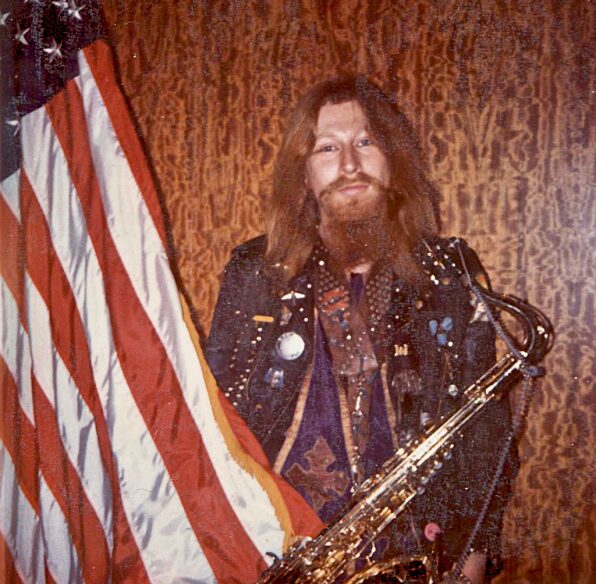
Their current co-manager Jeff Dexter had certainly had enough by this point:
“At the end of the gig in San Francisco, I said, ‘That’s it, we’re not going to manage you anymore. Let’s finish up the last few dates and that’ll be the end of our relationship.’”
But unknown to Dexter, Dave Brock had already decided to break up Hawkwind, despite a UK tour having been booked:
“They were all given their air tickets and money to get home. I stayed on in LA for another seven days. I’d gone out to have lunch at A&M Records, and I was driving away from the building, and suddenly there’s this character waving me down in the street round the corner from the office, and it was Brock. And I said, ‘You’re supposed to be home.’ ‘Oh, I didn’t want to go, so I sold my ticket. Now I haven’t got a ticket to get home.’ Fucking hell…”
The revised and expanded edition of Sideways Through Time: An Oral History Of Hawkwind In The 1970s is available now from Strange Attractor

